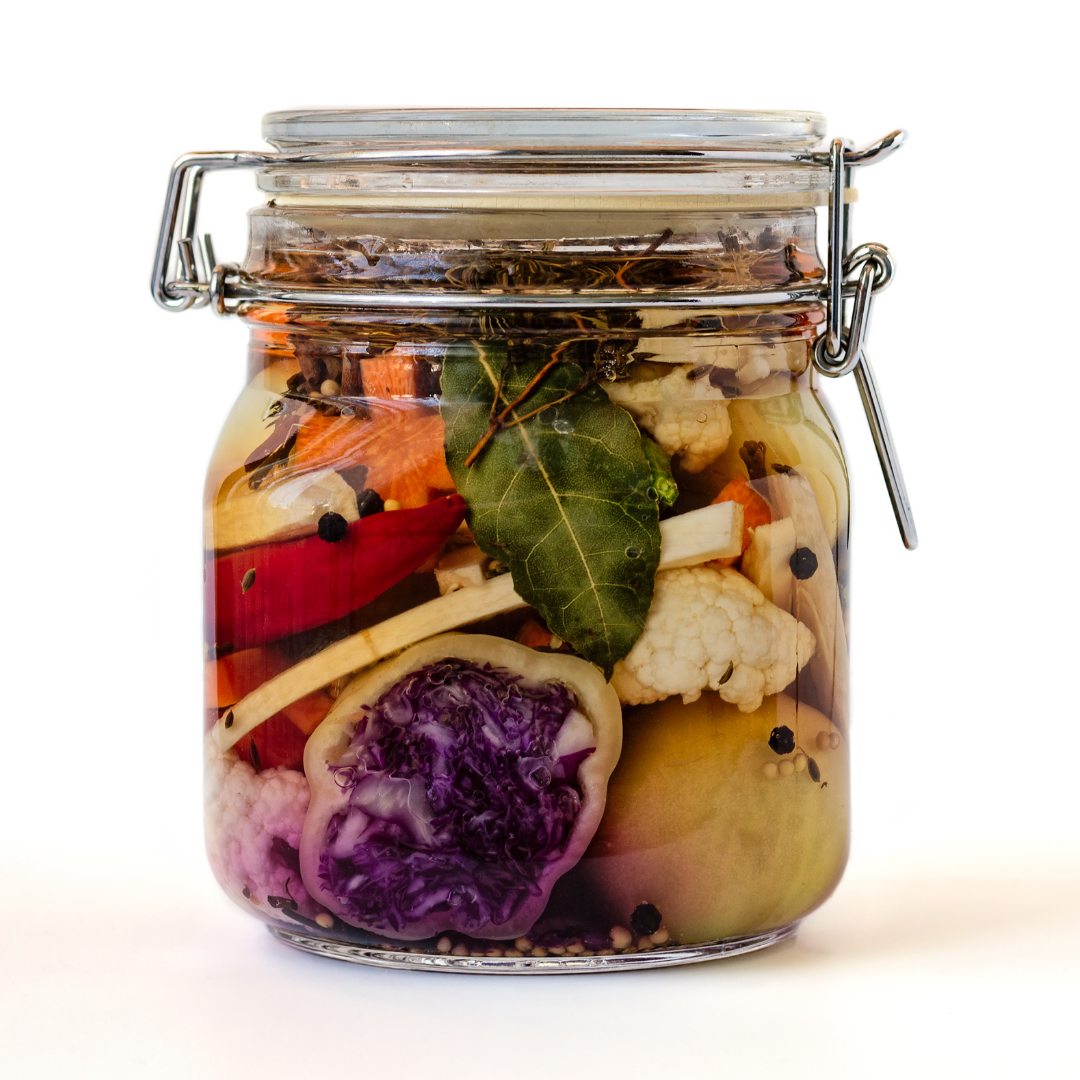
It’s hard to keep up with the amount of functional foods containing pre- and probiotics hitting supermarket shelves! For clarity, prebiotics are non-digestible dietary fibres that promote the growth of healthy intestinal microflora. Prebiotic food sources often contain inulin and fructo- and galacto-oligosaccharides. Food sources include onions, garlic, leek, bananas, asparagus, chickpeas and lentils and wholegrain cereals. Probiotics are live micro-organisms that when confirmed at an adequate amount confer a health benefit. Food sources include fermented foods such as yoghurt, pickled vegetables and miso. Postbiotics are the substances released or produced as a by-product during the fermentation process of beneficial micro-organisms. Postbiotics include short chain fatty acids like butyrate and bioactive peptides. Postbiotics are found in foods that have been fermented by live bacteria such as apple cider vinegar and sauerkraut.
They are all connected – in the gut, probiotics feed on prebiotics of which postbiotics are the by-product. This relationship promotes a healthy balance of gut bacteria and improved digestive health. In turn, it is suggested that by optimising the gut microbiome, nutritional intake of prebiotics and probiotics may indirectly support skin health via immune modulating effects.(1)

Overall, the majority of studies in the area of probiotics and skin health have examined the effect of Lactobacillus and Bifidobacterium strains.(1) Both these probiotic strains are derived from dairy and have a long history of safe use. There are corroborating findings that nutritional intake of foods containing these probiotic strains and/or supplementation improves skin health via the following actions:
- Improved levels of skin hydration and improved skin barrier function. (2)
- Exerting a protective effect to skin immune system function. (3,4)
- An indirect effect of improved skin health via modulation of phenol production by the gut microbiota) ~ that is, supporting gut microbiome health. (5)
These probiotics are found in fermented milk drinks, keffir and yoghurt.
Whilst more research is needed in the area of chronic skin disease management, current evidence suggests probiotics may exert a positive effect on skin immunity and modulate, ie. reduce, the inflammatory response in atopic skin diseases, such as dermatitis and eczema.(6)

The topical use of probiotics in skin care is an exciting and emerging area of skin care research whereby the direct effect of probiotics to the skin appear to provide protective and supportive actions to the skin microbiome and enhance the skins’ natural defence barrier. To date, research has focused on the effect of probiotic antimicrobial peptides, plant stem cells and lactobacillus ferment lysate to the prevention of acne breakouts, skin pH. balance and modulation of skin inflammation.(7,8) Due to the potential immune modulating and microbiome balancing actions, I have include Noni Quora plant probiotic in the Clear Complexion Moisturiser, suitable for acne-prone and oily/sensitive skin types.
Overall, we can expect more research in the health promoting effects of pre-, pro and postbiotics at both a nutritional and topical level in the future. For the time being, the incredible range of prebiotic and probiotic foods and supplements available, makes it easy for all of us to include these health supporting products into our regular diet.
REFERENCES
1.Peng M, Tabashun Z, Anderson M, et al. Effectiveness of probiotics, prebiotics and prebiotic-like components in common functional foods. Comp Rev Food Sc Food Safety. 2020; 19(4):1908-1933
2.Sander M, Merenstein D, Ratsall R, et al. Probiotics and prebiotics in intestinal health and disease from biology to the clinic. Nat Rev Gast & Hepat. 2019;16:605-616
3.Kober M. The effects of probiotics on immune regulation, acne and photoaging. Int J Women’s Derm. June 2015;1(2):85-89
4.Bouilly‐Gauthier D, Jeannes C, Maubert Y, et al. Clinical evidence of benefits of a dietary supplement containing probiotic and carotenoids on ultraviolet‐induced skin damage. B J Derm. 2010;163: 536-543
5. Miyazaki K, Masuoka N, Kano M, et al. Bifidobacterium fermented milk and galacto-oligosaccharides lead to improved skin health by decreasing phenols production by gut microbiota. Beneficial Microbes. 2014; 5(2):121-128
6.Lewis E, Pae M, Meydani S. Nutritional Modulation of Immune Function: Analysis of Evidence, Mechanisms and Clinical Relevance. Frontiers Immunol. 2019; 9:1664-3224.
7.Lolou, V.; Panayiotidis, M.I. Functional Role of Probiotics and Prebiotics on Skin Health and Disease. Fermentation.2019; 5, 41.
8.Roudsari MR, et al. Health effects of probiotics on the skin. Crit Rev Food Sci Nutr. 2015; 55(9):1219-1240.